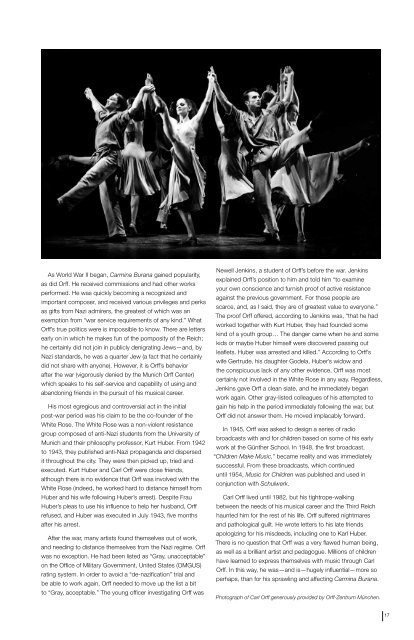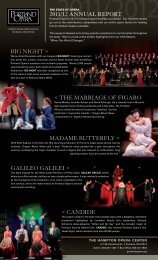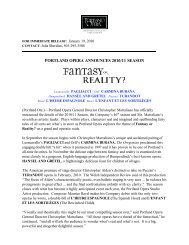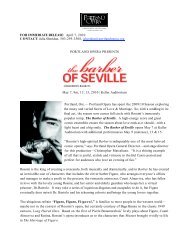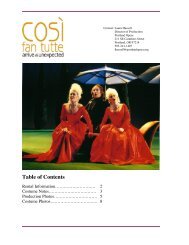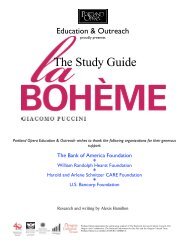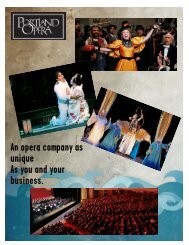christopher mattaliano - Portland Opera
christopher mattaliano - Portland Opera
christopher mattaliano - Portland Opera
Create successful ePaper yourself
Turn your PDF publications into a flip-book with our unique Google optimized e-Paper software.
As World War II began, Carmina Burana gained popularity,<br />
as did Orff. He received commissions and had other works<br />
performed. He was quickly becoming a recognized and<br />
important composer, and received various privileges and perks<br />
as gifts from Nazi admirers, the greatest of which was an<br />
exemption from “war service requirements of any kind.” What<br />
Orff’s true politics were is impossible to know. There are letters<br />
early on in which he makes fun of the pomposity of the Reich;<br />
he certainly did not join in publicly denigrating Jews—and, by<br />
Nazi standards, he was a quarter Jew (a fact that he certainly<br />
did not share with anyone). However, it is Orff’s behavior<br />
after the war (vigorously denied by the Munich Orff Center)<br />
which speaks to his self-service and capability of using and<br />
abandoning friends in the pursuit of his musical career.<br />
His most egregious and controversial act in the initial<br />
post-war period was his claim to be the co-founder of the<br />
White Rose. The White Rose was a non-violent resistance<br />
group composed of anti-Nazi students from the University of<br />
Munich and their philosophy professor, Kurt Huber. From 1942<br />
to 1943, they published anti-Nazi propaganda and dispersed<br />
it throughout the city. They were then picked up, tried and<br />
executed. Kurt Huber and Carl Orff were close friends,<br />
although there is no evidence that Orff was involved with the<br />
White Rose (indeed, he worked hard to distance himself from<br />
Huber and his wife following Huber’s arrest). Despite Frau<br />
Huber’s pleas to use his influence to help her husband, Orff<br />
refused, and Huber was executed in July 1943, five months<br />
after his arrest.<br />
After the war, many artists found themselves out of work,<br />
and needing to distance themselves from the Nazi regime. Orff<br />
was no exception. He had been listed as “Gray, unacceptable”<br />
on the Office of Military Government, United States (OMGUS)<br />
rating system. In order to avoid a “de-nazification” trial and<br />
be able to work again, Orff needed to move up the list a bit<br />
to “Gray, acceptable.” The young officer investigating Orff was<br />
Newell Jenkins, a student of Orff’s before the war. Jenkins<br />
explained Orff’s position to him and told him “to examine<br />
your own conscience and furnish proof of active resistance<br />
against the previous government. For those people are<br />
scarce, and, as I said, they are of greatest value to everyone.”<br />
The proof Orff offered, according to Jenkins was, “that he had<br />
worked together with Kurt Huber, they had founded some<br />
kind of a youth group… The danger came when he and some<br />
kids or maybe Huber himself were discovered passing out<br />
leaflets. Huber was arrested and killed.” According to Orff’s<br />
wife Gertrude, his daughter Godela, Huber’s widow and<br />
the conspicuous lack of any other evidence, Orff was most<br />
certainly not involved in the White Rose in any way. Regardless,<br />
Jenkins gave Orff a clean slate, and he immediately began<br />
work again. Other gray-listed colleagues of his attempted to<br />
gain his help in the period immediately following the war, but<br />
Orff did not answer them. He moved implacably forward.<br />
In 1945, Orff was asked to design a series of radio<br />
broadcasts with and for children based on some of his early<br />
work at the Günther School. In 1948, the first broadcast,<br />
“Children Make Music,” became reality and was immediately<br />
successful. From these broadcasts, which continued<br />
until 1954, Music for Children was published and used in<br />
conjunction with Schulwerk.<br />
Carl Orff lived until 1982, but his tightrope-walking<br />
between the needs of his musical career and the Third Reich<br />
haunted him for the rest of his life. Orff suffered nightmares<br />
and pathological guilt. He wrote letters to his late friends<br />
apologizing for his misdeeds, including one to Karl Huber.<br />
There is no question that Orff was a very flawed human being,<br />
as well as a brilliant artist and pedagogue. Millions of children<br />
have learned to express themselves with music through Carl<br />
Orff. In this way, he was—and is—hugely influential—more so<br />
perhaps, than for his sprawling and affecting Carmina Burana.<br />
Photograph of Carl Orff generously provided by Orff-Zentrum München.<br />
17


